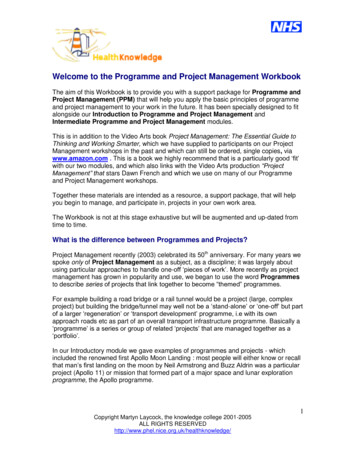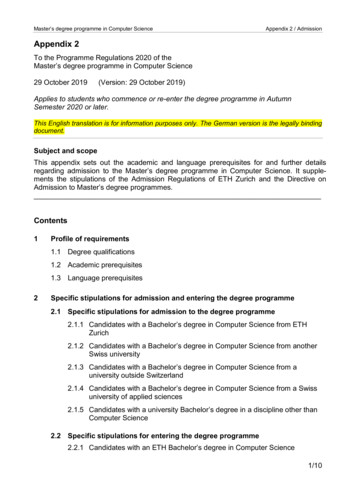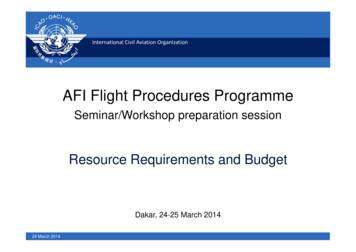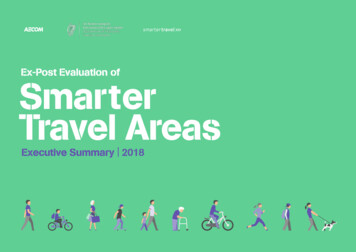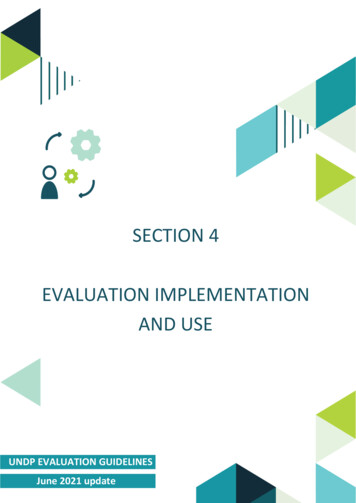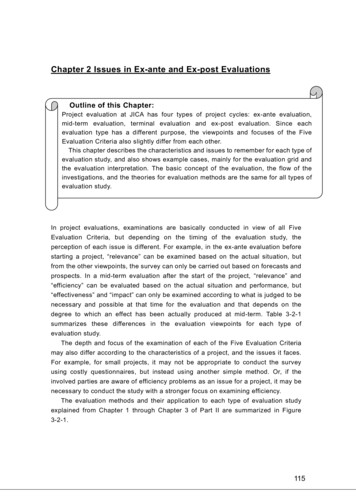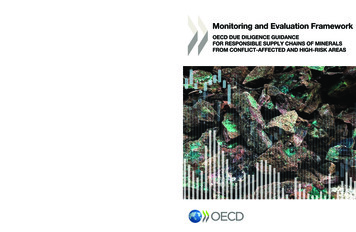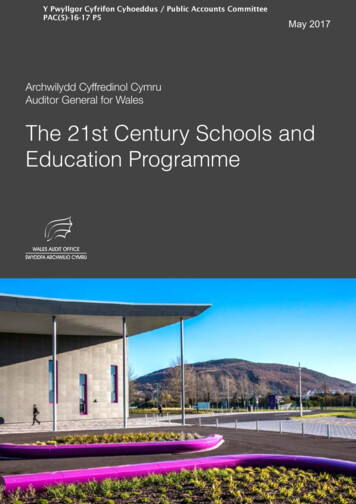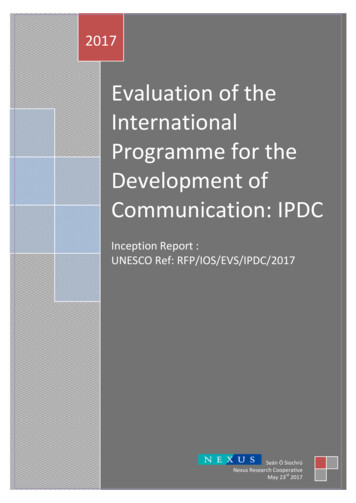
Transcription
2017Evaluation of theInternationalProgramme for theDevelopment ofCommunication: IPDCInception Report :UNESCO Ref: RFP/IOS/EVS/IPDC/2017Seán Ó SiochrúNexus Research CooperativerdMay 23 2017
CONTENTS1.2.Introduction and Scope . 11.1Brief Description of the Programme . 11.2Aim and Scope of the Evaluation . 11.3Work Completed during the Inception Phase . 2Methodology . 32.1Scope . 32.2Evaluation Questions . 32.3Data Gathering Methodologies and Instruments . 42.4Evaluation Tasks . 4Strand 1. IPDC outcomes sought and achieved . 4Strand 2. IPDC Governance, Management, Organisation and FUnding . 6Strand 3. IPDC Specific Role and Value to Peers and Constituents: . 8Analysis, Drafting and Reporting . 93.Work plan & TImeline . 104.Logistics and Administration . 12Annex 1: Evaluation Matrix. 13Annex 2: Proposed List of Informants . 16Annex 3: References Reviewed to Date . 17
1.INTRODUCTION AND SCOPE1.1BRIEF DESCRIPTION OF THE PROGRAMMEThe International Programme for Development of Communication (IPDC) is a multilateral programmeof UNESCO founded in 1980. It is the only programme in the United Nations system specificallydesigned to mobilize the international community to discuss and promote media development indeveloping countries.The overriding objective of IPDC –guided by an Intergovernmental Council comprising 39 memberstates elected by UNESCO's General Conference meeting every two years – is to contribute tosustainable development, democracy and good governance. It does this by fostering universal accessto and distribution of information and knowledge through strengthening the capacities ofdeveloping and least developed countries in the field of electronic media and print press as well asthe promotion of freedom of expression and media pluralism.IPDC operates through a number of modalities. A key one throughout its history is the provision offinancial support for media development projects. Since its creation it has invested in over 1,700projects across 140 countries using extra-budgetary sums exceeding US 100 million. About 40% ofthis has gone into Funds in Trust dedicated to specific activities, and the rest into open-applicationlocal and regional projects.The IPDC Bureau, comprising eight countries elected by the Council, meets annually to identifysuitable projects for support, following a defined procedure and in line with six priority areas.The Secretariat of the IPDC is provided by the Communication and Information (CI) Sector ofUNESCO.1.2AIM AND SCOPE OF THE EVALUATIONThe IPDC Council, at its 30th session in 2016, decided to commission a new evaluation of theProgramme. This evaluation will take into consideration the social, economic, political and culturalchanges of societies worldwide since the creation in 1980 of the IPDC, and since its latest evaluationin 2006. It will also consider the changes over the last decade in terms of how globalisation anddigitisation have influenced the communication systems, their evolution and functions as well asmanagement practices and markets. These trends have affected the activities of the IPDC as well asUNESCO’s general work regarding media and communication.The main purpose of the evaluation is to assess the relevance, efficiency and results of the IPDC andto generate recommendations for the future. The evaluation findings and recommendations will beuseful inputs to the CI sector management, the IPDC Intergovernmental Bureau and Council, as wellas to the Working Group on governance, procedures and working methods of the governing bodies ofUNESCO (established at the 38th UNESCO General Conference Resolution 101) with regard togovernance-related issues. The evaluation will also be useful for follow-up to the recommendationIPDC Evaluation Inception Report1 P a g e
of the External Auditors for there to be an assessment of the costs and benefits of the specific formof governance of IPDC activities.The evaluation will examine the role of the IPDC and its governing bodies between 2011 and 2016,also noting any major developments since the previous evaluation in 2006 that were taken intoaccount by the IPDC Council.1.3WORK COMPLETED DURING THE INCEPTION PHASESo far, the following work has been carried out during the Inception Phase: Initial analysis of the relevant UNESCO documentation A two day inception visit by the evaluator to UNESCO Headquarters in May 10th and May 11th.This included meetings with:o The Evaluation Reference Group which comprises:1) Guy Berger, IPDC Secretary, Director, Division of Freedom of Expression and MediaDevelopment ;2) Geoffrey Geurts, Principal Evaluation Specialist, Internal Oversight Service;3) Albana Shala, Chairperson of the IPDC Bureau; and4) Rosa Maria Gonzalez, Deputy Secretary to IPDC.Two meetings were held, at the commencement and completion of the inception visit.oSeparate meetings with all members of the IPDC Secretariat;oThe CI Administrative Unit (CI/AO) and Executive Office (CI/EO);oRepresentatives of five Permanent Delegations to UNESCO who have recently supportedIPDC. Certain refinements were agreed with the Reference Group regarding the evaluationmethodology, which are incorporated here. Extensive additional documentation of relevance was identified. The Inception Report concludes the Inception Phase.IPDC Evaluation Inception Report2 P a g e
2.METHODOLOGY2.1SCOPEIPDC supports a spread of relatively diverse activities and interventions aiming at differentoutcomes, interrelated ultimately through attempting to influence different levels of the mediasector, from grass-roots capacities through to normative principles and governance instruments andstructures.This assignment is not just about assessing IPDC outcomes, however. It will also cover the IPDC’smanagement, governance, funding and organisation. Furthermore, it will consider the positioning ofthe IPDC within UNESCO, within the UN Family and in relation to its peers in the global media fordevelopment sector.2.2EVALUATION QUESTIONSThe evaluation questions are grouped and summarised into three research strands as follows. TheEvaluation Matrix is contained in Annex 1, presents the sub-questions and main sources of data.Strand 1. IPDC Outcomes Sought and Achieved1.1The operational capacity building programme’s outcomes on the six IPDC Priority Areas1.2Contribution of normative and standard-setting to media development1.3Outcomes of research on guiding media development efforts1.4Contribution to journalists’ safety of mandated monitoring and reporting mechanisms1.5Outcomes of IPDC Special Initiatives in mobilising international support1.6Specific outcomes on gender equalityStrand 2. Programme Funding, Management, Governance and Organisation2.1The costs and benefits of IPDC’s specific governance structures2.2IPDC efficiency in terms of a) financial and human resources, b) number/range of projects(linked to the number of priority areas agreed by the IPDC governing bodies), c) quality ofmonitoring and evaluation2.3Explanation of recent fundraising patterns and their causesStrand 3. Specific Role and Value to Peers and Stakeholders3.1IPDC’s value to core constituencies: UNESCO Member, Field Offices, partners, beneficiaries,and donors3.2Role and value added of IPDC as an intergovernmental programme within UN and theframework of international media development community3.3IPDC complementarity with other UNESCO entities e.g. CI Sector, UNESCO Field Offices,Institutes and Centres, networks and partnersIPDC Evaluation Inception Report3 P a g e
2.3DATA GATHERING METHODOLOGIES AND INSTRUMENTSHere, the data gathering instruments to be utilised are first summarised. They are designed tocapture the widest possible set of views, ideas and data, including quantitative and qualitative.1) Extensive desk research and documentary analysis, official, academic and grey literature.2) One-to-one interviews with the following, to gain insights into current IPDC governance,processes, priorities, costs and future possibilities (excluding Field Visits; Numbers are indicative): IPDC Secretariat current and former members (4 – several interviews expected of each)UNESCO Staff in CI: ADG, FEM/MAS, FEM/FOE, KSD/UAP, KSD/ICT, CI/EO and CI/AO (8)IPDC Bureau members (all 8 members)IPDC Council members (those seeking to provide information)Donors and potential donors to IPDC (8 to 10)Selected Media experts and Key Constituents (up to 12)3) Online Surveys to gather information and views from key UNESCO stakeholders on IPDCgovernance, outcomes, priorities and possible directions, to include: IPDC Council Members (39)IPDC Field Offices, including Communications Advisors and Professional staff (31)4) Field Visits, including interviews and Focus Group discussions as appropriate, regarding how IPDCProjects relate to national and regional UNESCO plans, local priorities and needs, and gatheringinformation and views on IPDC outcomes, priorities and possible direction, to the following: 2.4Bangkok Regional Office, including three to four IPDC funded Projects (10 to 15 interviews)Nairobi Regional Office, including three to four IPDC funded Projects (10 to 15 interviews)EVALUATION TASKSTasks responding to each of the three Evaluation Question Stands are presented below. The datagathering instruments are mentioned in each case, and highlighted in bold for ease of reference.STRAND 1. IPDC OUTCOMES SOUGHT AND ACHIEVEDIPDC outcomes as referred to here comprise the outcomes of the interventions financially supportedby the IPDC over the 2011 to 2016 period inclusive. Specifically these include:A) A total of 434 Media Development Projects (MDPs) supported with small grants approvedbetween 2011 and 2016 inclusive;B) IPDC Special Initiatives (SIs) comprising specifically:1.2.3.4.“Monitoring and Reporting Mechanisms on the Safety of Journalists & the Issue of Impunity”“Media-related Indicators, including MDIs, JSIs, MVIs and GSIMs”“Global Initiative for Excellence in Journalism Education”“Knowledge-Driven Media Development, and monitoring of SDG 16.”Each intervention type will require different methodological treatment.IPDC Evaluation Inception Report4 P a g e
TASK 1.1: THE MDPSWith a total of 434 separate projects, it is not possible to undertake empirical analysis of theoutcomes of each. Rather the approach will begin with an overall data mapping and analysis of allIPDC MDP interventions based on readily available data, which will then be further explored by aqualitative analysis based on a sample, using existing documentation of each intervention type.From there, the wider context and relevance of the MDPs’ development and implementation will beexamined, through field visits to Regional Offices, interviews with staff and with Projects themselves.Among issues explored will be whether the current IPDC Priority areas are appropriate in numberand focus, whether others might be considered, and so forth, and recommendations will be made.Task 1.1.1 Mapping and Overview of IPDC Projects and Intervention DataAll IPDC MDPs approved in the period from 2011 to 2016 (including those approved in 2016, andrunning through to December 2017) will be analysed drawing on the IPDC database and on readilyavailable project documentation. An initial set of data to be reviewed, with results presented intabular forms, is the following, and additional data sets will be added if possible: The IPDC Priority Areas under which each MDP has applied;The relevant UNESCO Field Offices (approximately 32 CI staff working globally), and Region;The specific geographical coverage (national, regional etc.);Funding requested and funding actually received;Whether completed or not;Outputs.The data will be presented on an annual basis.Task 1.1.2 Qualitative Analysis of MDPsDuring the same periods, a brief qualitative exploration will be undertaken of a sample of MDPs, with a view toreviewing trends emerging from the tabular data, exploring for instance changing priorities, sizes and type ofgrants (national, regional), submission route and support given, and so forth.Depth will be added to this through consideration of MDP Implementation Reports and the AnalyticalOverview of these Implementation Reports, all of which are compiled for the Bureau each year.Task 1.1.3 MDP National and Regional Context and DynamicsUnderstanding the context in which IPDC projects are conceived and developed and the dynamics and issuesthey are intended to address is critical to an appreciation of the wider picture of their relevance, impact andfuture potential. The role of Regional and Field Offices is critical here, as they frequently support thedevelopment of proposals and frequently are involved in initiating them, and are best placed to understandthe media and communication needs.To achieve this, two Field Visits to Regional UNESCO Offices will be undertaken, to Bangkok and Nairobi. Thiswill enable one-to-one interviews and group discussions with UNESCO staff including the CI Advisers, withrelevant national authorities, with project themselves including beneficiaries; and examination of how theMDPs proposed and approved fit with regional and national priorities. An overview of a limited number ofProjects (3 to 4 in each region) in terms of its outcomes and links to local needs and priorities will becompleted.IPDC Evaluation Inception Report5 P a g e
Moreover, the scope of the investigation will be broadened through the inclusion of specificquestions on these issues in the Regional and Field Office Survey. This will assess the views of thevalue of the MDPs, and the extent to which they are an integral part of UNESCO Field Officestrategies or Regional strategies in communication. Similarly, the survey of IPDC Council memberswill be used as an opportunity to gain insights from their perspective.Many of the MDPs are referred to and supported by staff in other parts of CI (FOE and MAS), andinterviews with CI staff there should offer insights into their views regarding the effectiveness andappropriateness of the MDPs with which they are in contact.TASK 1.2 THE SPECIAL INITIATIVESThe four IPDC Special Initiatives will be each examined separately through documentary analysis andinterviews with UNESCO staff and other key stakeholders involved in their design andimplementation.The work will involve the following tasks:Task 1.2.1 Initial Exploration through Desk ReviewIdentifying, obtaining and reviewing all key documentation concerning the origins and ongoingimplementation of these four initiatives is the first task.Task 1.2.2 In-Depth-Interviews Initial RoundIn-depth interviews will be undertaken with current and former IPDC Secretariat staff, and otherstakeholders involved in designing and implementing each of the initiatives. Their purpose will be toenable a detailed description of each Initiative and an understanding of its dynamics.Task 1.2.3 Wider context, impact, potential and IssuesSeveral methods will be used to widen the scope of the understanding of these, and on the process,relevance, outcomes and potential of these initiatives, as well as issues arising.A cascading method will be used to interview individuals in a position to comment meaningfully andfrom different perspectives. Interviewees will be identified from the initial round but also fromother sources. Additional people will be interviewed for each special initiative. These might includeIPDC Bureau and Council members, Regional and Field Office staff, and donors but also othersexperts and UN or other agency staff involved in the initiatives. Accredited NGO members ofUNESCO might also be consulted.The two surveys, of Council Members and of Regional and Field Staff, will also include questionscovering these initiatives.STRAND 2. IPDC GOVERNANCE, MANAGEMENT, ORGANISATION AND FUNDINGThe core questions here include: To what extent does IPDC governance, management and implementation, including theselection of MDPs, operate in the most effective and efficient ways possible and in a gendersensitive manner?IPDC Evaluation Inception Report6 P a g e
What are the costs and benefits of the current IPDC governance structure? In what mannerdoes the governance structure provide strategic guidance to IPDC?What factors influence the level and nature of donor funding being provided to IPDC, in thewider context of funding for the sector?To what extent have recommendations from the 2006 evaluation been considered and/orimplemented?TASK 2.1 INITIAL EXPLORATION AND DESK REVIEWThe Desk review will identify, obtain and review all key documentation concerning IPDC governancein general, and the costs of implementing IPDC MDPs and Special Initiatives. This will include, as apreliminary list, Council and Bureau documents circulated at meetings, Minutes and Reports to theGeneral Conference; Staff time allocations; and Annual IPDC Financial Reports, and data provided bythe AO and EO.TASK 2.2 IN-DEPTH ANALYSIS OF DYNAMICSThe dynamics of the governance and management structures will be explored in terms of theircoherence and dynamics through in-depth interviews. This will include IPDC Secretariat members,and proceed to IPDC Bureau members and others identified as relevant.The goal will be to obtain a clear outline of all phases of IPDC MDPs and Special Initiatives, and theirassociated costs, including points at which and manner in which UNESCO’s gender equality priority isincorporated. The views of those involved in governance will also be documented.A number of questions will be included regarding these issues in the IPDC Council andRegional/Field Office Surveys.TASK 2.3 ANALYSIS OF FUNDING VARIATIONS AND TRENDSAn analysis will be undertaken of the funding received by IPDC, including Funds in Trust Accounts,over the period 2011 to 2016. This will comprise documentary and data analysis, and trends andmotivations will also be explored in Interviews with major donors, potential and IPDC Secretariat,UNESCO Staff and IPDC Bureau.TASK 2.4 COMPARATIVE ANALYSIS OF OTHER RELEVANT PROGRAMMESAlso included here will be a comparative examination of how other global support projects aregoverned and implemented. Such Programmes need not necessarily be media related as it is themanagement and administration systems that are of primary interest here, though the WACC smallgrant programme is particularly relevant1. At least one other UNESCO programme, of a similarstructure, will also be compared. The purpose is to gather ideas to present options on how IPDCmight refine its structures in future. This will be a desk research exercise.1See jects-2012-to-2016IPDC Evaluation Inception Report7 P a g e
TASK 2.5 REVIEW OF 2006 IPDC EVALUATION RECOMMENDATIONSThe Terms of Reference refer specifically to recommendations put forward in the 2006 IPDCevaluation, with a view to assessing the extent to which they have been implemented. This will becompleted, based on data gathered under other Tasks.STRAND 3. IPDC SPECIFIC ROLE AND VALUE TO PEERS AND CONSTITUENTS:IPDC exists in an evolving environment with regard to media and communication including socialmedia and the Internet more widely; with regard to the governance and regulatory environmentglobally, regionally and nationally; with regard to the evolution and appearance of new actors withinthe overall sphere of media and development and adjacent areas such as freedom of information,transparency, and accountability; and with regard to UNESCO itself, the different Sectors andDivisions, its key stakeholders and the UN system as a whole.In this context, key questions include: How has the “niche space” occupied by IPDC over several decades evolved and been shapedand reshaped by these factors;How could it take new directions in the light of these dynamics and improve itscomplementarities and contributions?Based upon its demonstrated niche and its capacities, both human and financial, what futuredirections are possible for IPDC?The key research tasks are as follows:TASK 3.1A REVIEW OF THE EVOLUTION OF MEDIA SPACE OCCUPIED BY IPDCThis will comprise a desk review to paint a picture of the evolving media and communication, humanrights and development space in which IPDC operates and how it is evolving in the last decade or so,and the key factors that are driving this evolution. It will cover distinct areas including the nationallevel, developments with the UN family, wider media and communications trends in relation todevelopment communication, and other international organisations and trends.The purpose of the review will be to frame the current relevance of IPDC, and to contribute to anexploration of directions it could be taking.TASK 3.2THE VIEWS OF KEY UNESCO CONSTITUENCIESIt is vital that the views of a wide group of stakeholders be obtained in relation to the current andpotential future roles, and niche space, that IPDC might occupy. This may entail consideration of thecurrent number and focus of IPDC project priorities. Most of the data gathering approach andinstruments will be utilised in this task, with specific questions relating to these included where possible.These will include the one-to-one interviews with UNESCO staff and IPDC Bureau and other stakeholders,the Field Visits, and the surveys of both Council and UNESCO Field Offices.IPDC Evaluation Inception Report8 P a g e
ANALYSIS, DRAFTING AND REPORTINGTASK 4.1: DATA ANALYSISData gathered at all the stages above, including from the IDPC database and the two Surveys, will beconsolidated and analysed. This work will be spread throughout the evaluation.TASK 4.2: REFERENCE GROUP WORKSHOP & DRAFT REPORTEach of the above main Tasks will result in a Section of the report. These will be drafted during thecourse of the work, and reviewed together towards the end.The analysis and recommendations will be set in a wide context that will embrace the wider mediadevelopment sector, the relationship of IPDC with SDGs, and the two UNESCO global priorities. It willreference the IPDC mandate and, in the context of challenges and the evolving wider environment,consider what needs to be done to ensure its continuing and growing relevance in the future.Annexes will contain all the relevant evaluation information.The Draft Report will be produced and reviewed by the Reference Group.TASK 4.3: FINAL REPORT AND PRESENTATIONAfter comments are received, a final report will be prepared and presented as appropriate includingrecommendations regarding all areas covered. The report’s findings will be presented to the IPDCCouncil (the date of which remains to be confirmed).IPDC Evaluation Inception Report9 P a g e
3.WORK PLAN & TIMELINEThe Work Plan and Timelines are presented below, in accordance with the Contract. This is followed by a separate timeline for key data gatheringinstruments.Research atory Work and Inception Phase0.1: Initial Documentation & Briefing0.2: Inception Report:XStrand 1: Outcomes sought and achieved:1.1 Media Development Projects1.1.1: Mapping & Overview of Projects1.1.2 Qualitative Analysis of MDPs1.1.3 National & Regional Context (including Field Visits & interviews)1.2: Special Initiatives1.2.1 Initial Exploration by Desk Review1.2.2 In-depth Analysis through interviews1.2.3 Wider context, impact, potential and Issues.Strand 2: Funding, Management, Governance and Organisation2.1 Initial Exploration & Desk Review2.2 In-depth analysis of dynamics2.3 Analysis of Funding Variations and Trends2.4 Comparative Analysis of other Programmes2.5 Review of Implementation of 2006 Evaluation RecommendationsIPDC Evaluation Inception Report10 P a g e17
Strand 3: IPDC Role & Value to Constituency and Peers3.1 Review of the Evolution of IPDC Media and Communication Space3.2 The Views of Key UNESCO Constituencies (including surveys etc.)Analysis and Report Writing4.1 Data Analysis4. 2 Draft Report and Reference Group ReviewX4.3: Final ReportXKey Methodology Data Gathering DC Council SurveyA: Development of Survey InstrumentB: Dissemination and Survey CompletionC: Results AnalysisRegional and Field Office SurveyA: Development of Survey InstrumentB: Dissemination and Survey CompletionC: Results AnalysisRemote Interview ConcentrationParis Data Gathering Interviews (Subject to confirmation. 1 to 2 visits)Field Trips (subject to confirmation: Total 2 weeks)IPDC Evaluation Inception Report11 P a g e17
4.LOGISTICS AND ADMINISTRATIONThe Online Survey tool to be deployed is Survey Monkey Professional Level. All raw data can bemade available to UNESCO, if requested.Field Visit logistics, and meeting organisations, will require the support of UNESCO Regional office inNairobi and Bangkok.Paris Field visits will require assistance in scheduling the relevant meetings.Logistics for remote interviews will be undertaken by the consultant, assisted where relevant byUNESCO for the contact details of those to be interviewed.IPDC Evaluation Inception Report12 P a g e
ANNEX 1: EVALUATION MATRIXIssuesEvaluation Questions& Sub-QuestionsSources of InformationStrand 1. IPDC Outcomes Sought and Achieved1.1 The operational capacity buildingprogramme’s outcomes on the sixIPDC Priority Areas1.2 Contribution of normative andstandard-setting to mediadevelopment1.3 Outcomes of research on guidingmedia development efforts1.4 Contribution to journalists’ safety ofmandated monitoring and reportingmechanisms1.1.1 What is the extent of capacity building in the different IPDCPriorities Areas?1.1.2 What does the available evidence tell us about theoutcomes of that capacity building?1.1.3 Are the outcomes sustainable after Project completion?1.2.1 With regard to the Special Initiatives and MDPs, is thereevidence of a contribution to norms and standards?1.2.2 What has been the outcomes of such normative andstandard-setting in different contexts and at differentlevels?1.2.3 How could the contribution to strengthened?1.3.1 What are the key research outputs of IPDC?1.3.2 What is their dissemination and usage strategy?1.3.3 What is the evidence of these having guided mediadevelopment efforts?1.3.1 How has this Special Initiative evolved and extended itsinfluence?1.3.2 How have the monitoring and reporting mechanismsdeveloped and been reinforced?1.3.3 What is the evidence that governments responding tothese?1.3.4 What is the evidence that these responses are leading tochange in terms of enhancing journalists’ safety?IPDC Evaluation Inception Report Database of IPDC ProjectsIPDC project evaluation and Analytical ReportsIPDC Project final reportsField visits to IPDC projects and Regional offices IPDC Documentary analysisAdditional documentation regarding impactInterviews with UNESCO and other stakeholdersinvolved in these areas.Regional/Field office visitsSurvey of Council and of Regional/Field OfficesIPDC Documentary analysis including the researchoutputsSurvey of Regional/Field OfficesInterviews with UNESCO and relevantstakeholders.Regional/Field office visitsIPDC and UNESCO Documentary analysisAdditional UN system documentationInterviews with UNESCO and other relevantstakeholders.Regional/Field office visitsSurvey of IPDC Council and of Regional/FieldOffices 13 P a g e
1.5 Outcomes of IPDC Special Initiatives inmobilising international support1.6 Specific outcomes on gender equality1.5.1 In each case, what is the evidence that the SpecialInitiatives are gaining international support for what theyhope to achieve?1.5.2 What dynamics can explain this support and how can it bereinforced?1.5.3 Is there evidence that this support translates into donorcontributions towards Special Initiatives? 1.6.1 In what ways is gender being built into the IPDCprogramme design (including the priority areas)?1.6.2 In what ways are gender issues included in projectselection, including Special Initiatives?1.6.2 What is the evidence that there has been a sustainablechange in terms of gender-related outcomes? IPDC UNESCO and UN and other Documentarya
3.1 IPDC's value to core constituencies: UNESCO Member, Field Offices, partners, beneficiaries, and donors 3.2 Role and value added of IPDC as an intergovernmental programme within UN and the framework of international media development community 3.3 IPDC complementarity with other UNESCO entities e.g. CI Sector, UNESCO Field Offices,



